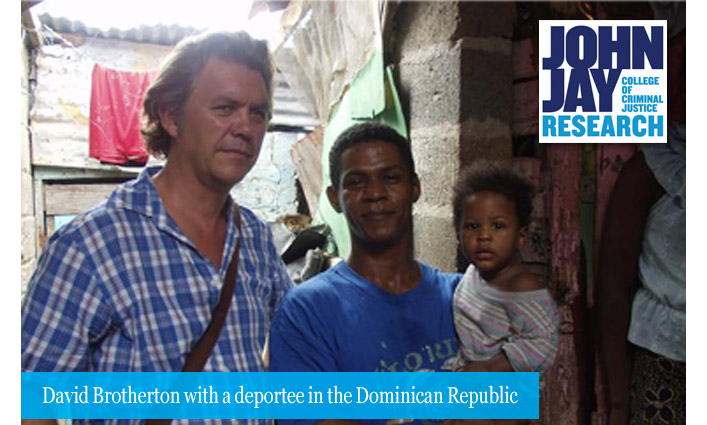
David Brotherton Ph.D., Professor of Sociology at John Jay and Founder and Director of the Social Change and Transgressive Studies Project, is leading projects spanning multiple countries, centered on subjects from post-release reintegration to immigration and the deportation pipeline that are creating an impact in underserved communities. Discussing the goals of his research, Brotherton notes there are three key points of overlap: “One part is to be able to transcend the academy, to translate your findings from the theory to what it actually means to people,” he says. “Second, you’re doing work that immediately has an impact, to understand or respond to a social problem. And the third thing is to work with the underrepresented, the marginalized, and to help develop knowledge that goes back to them, to empower them.”
Growing up in a working-class London neighborhood, Brotherton has always been interested in the day-to-day conditions and labeling faced by people just trying to get by. His early work in youth organizing and career in sociology and criminology led him to research gangs and incarceration. As he tells the story, Brotherton’s work with infamous gang organization the Latin Kings brought him to the Dominican Republic in the early 2000s, where he was giving a talk on his project. “People didn’t want to know about the gangs. All they wanted to know was, ‘Why are you sending them all back here?’” says Brotherton. “And I said, ‘I don’t know, but I’ll find out.’” That was the start of his investigations into transnational gangs and the issue of deportation, which at the time was not well-studied. That work has led to multiple grants and studies, books including Banished to the Homeland: Dominican Deportees and Their Stories of Exile and Immigration Policy in the Age of Punishment: Detention, Deportation, Border Control, and the evolution of the multinational TRANSGANG project in Europe, which he advises.

Digging Deeper into the Deportation Pipeline
Looking ahead to upcoming research, Brotherton will be working with personnel from Rutgers, including Sarah Tosh ’16, a John Jay College alumna and Assistant Professor of Sociology, Anthropology, and Criminal Justice at Rutgers, to kick off the Deportation Pipeline Project, funded by the National Science Foundation. The team will interview a variety of subjects—immigrants from the Dominican Republic, Jamaica, and Trinidad and Tobago, including some who have been detained for deportation hearings; lawyers; judges; and even ICE agents, if possible—to understand the racialized “deportation pipeline” that runs through New York City back to the Caribbean, and the current situation these communities are living through.
The two-year study will culminate in a book on the topic and a conference with representatives from other municipalities. But Brotherton is already looking past the conclusion of the research to a potential comparative study in another large city or small town, to understand the dynamics of deportation in other American environments with similar demographics being targeted by immigration officials.
“We realized there is no real program for rehabilitation anywhere in Latin America, no probation, nothing like that. Once you come out of prison, you’re on your own. So, what we’re developing for El Salvador is really a model for the whole of Latin America.” —David Brotherton
Creating Change Through Critical Gang Studies
Under the Social Change Project this year, Brotherton is also wrapping up several projects. Since 2019, he’s been consulting the World Bank in El Salvador, developing national strategies for rehabilitation and reinsertion programs for formerly-incarcerated gang members in that country, which has the second-highest imprisonment rate in the world after the United States. In April 2021, the Social Change Project published a paper summarizing those findings, expanding on them, and making recommendations. “As we were writing this, we realized there is no real program for rehabilitation anywhere in Latin America, no probation, nothing like that,” says Brotherton. “Once you come out of prison, you’re on your own. So, what we’re developing for El Salvador is really a model for the whole of Latin America.”
This July, Brotherton will also see the publication of an edited volume of the Routledge International Handbook of Critical Gang Studies, which he edited along with Rafael Jose Gude, a Research Fellow at the Social Change Project. The book will offer new perspectives on gang studies, placing them in the context of their political and social environments.
Studying the Power of Credible Messengers
Brotherton is also working on a book on the Credible Messenger phenomenon, due out in 2022. What’s Love Got To Do With It?: Credible Messengers and the Power of Transformative Mentoring begins with a history of the now widespread program, which recruits the formerly-incarcerated to intervene with young, at-risk kids from their neighborhoods, to keep them away from involvement with the criminal legal system. The book also incorporates qualitative research, including interviews with messengers, kids, administrators, and the currently incarcerated.
“We’re following that tradition of socially conscious, critical social science.” —David Brotherton
Brotherton is proud to be doing work that makes a difference for underserved, understudied communities facing immense challenges. “I think the project carries on a rich tradition at John Jay. We’re following that tradition of socially conscious, critical social science.”



